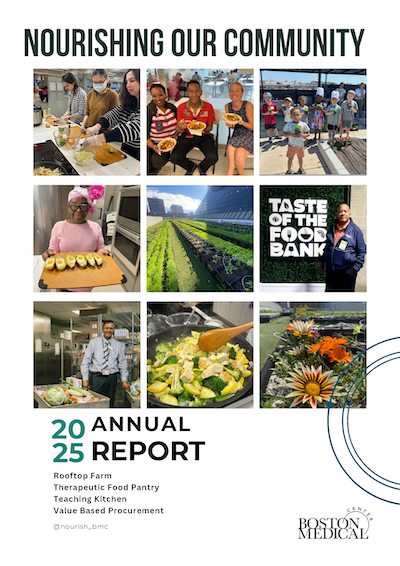At Boston Medical Center (BMC), we recognize that access to nutritious, affordable food is a critical factor in achieving better health outcomes. This belief drives our every action and shapes the care we provide to our patients and community.

Food Is Medicine
For over 20 years, BMC has tackled food insecurity through pioneering programs like our Preventive Food Pantry and Teaching Kitchen. We’ve reshaped healthcare by addressing patients’ core needs and proving that food is medicine.
Defining Food Is Medicine
A collaborative partnership between health systems and communities to deliver food-based nutrition programs and interventions aimed at promoting health, enhancing wellbeing, and supporting the prosperity of local populations.
Our mission is to continue to leverage food is medicine to improve food access for all, invest in a sustainable local food system, and empower communities through skill-building education.
I was tired of having mothers burst into tears when I told them their children had to eat three times a day.

Programs and Initiatives
BMC’s Nourishing Our Community programs unite services, partnerships, and research to reduce food insecurity and promote health equity across Boston. This expansive initiative serves as a national model for hospitals, prioritizing access to healthy food and resources as an essential aspect of care.
The Nourishing Our Community Program brings our mission to fruition by offering:
Preventive Food Pantry
Teaching Kitchen
Rooftop Farm
Boston Medical Center Health System recognizes that a healthy environment is essential to a healthy community. By focusing on sustainability, we’re addressing the root causes of poor health, including creating an environment that helps ensure access to fresh, nutritious food. Our Clean Power Prescription Program is also a key part of our efforts to promote overall health through environmental responsibility.
Annual Report
 Read our Annual Report to learn about our recent programming, successes, and challenges at the Rooftop Farm, Therapeutic Food Pantry, Teaching Kitchen, and in Value-Based Procurement.
Read our Annual Report to learn about our recent programming, successes, and challenges at the Rooftop Farm, Therapeutic Food Pantry, Teaching Kitchen, and in Value-Based Procurement.
Download the Nourishing Our Community 2025 Annual Report (PDF)
Our Impact and Legacy
1.5 million
people served since the Preventive Food Pantry launched in 2001
1 million pounds
of food distributed annually
8,000 square feet
of growing space at our rooftop farms
15 culinary-nutrition classes
taught virtually and in-person per month

In the News
Our work has gained national recognition for reshaping healthcare through the idea that food is medicine. Explore recent coverage:
- NPR “Shots”: Why these doctors started writing medical ‘prescriptions’ for solar power
- HealthCity: At One Year, Nubian Markets Is a Thriving Hub for the Community
- NBC10 Boston: BMC is growing fresh food in rooftop gardens to better serve its patients
- BMC News: Boston Medical Center Codesigns Food Is Medicine Resources with Local Community as Part of New Study
- Stat: At a hospital’s teaching kitchen, patients get a taste of food as medicine
- HealthCity: Finding Joy in Food: How Cooking With Others Can Bolster Recovery
- HealthCity: Bringing Healthy Food and a Community Hub to Roxbury
- WGBH “Under the Radar”: Can a healthy diet treat disease? Why some argue food is medicine
- BMCC News: BMCC Rooftop Now Home to Manhattan’s Largest Public Solar Panel Project
- Boston Magazine: Patients Are Learning to Cook Healthier at the Boston Medical Center Demonstration Kitchen
Together, we’re proving that food can do more than nourish — it can heal, empower, and transform communities.

Get Involved!
We’re always looking for volunteers for our Rooftop Farms and Teaching Kitchen!
- For Rooftop Farms, contact our farm manager at farm@bmc.org.
- For the Teaching Kitchen, reach out to gabrielle.simons@bmc.org.
